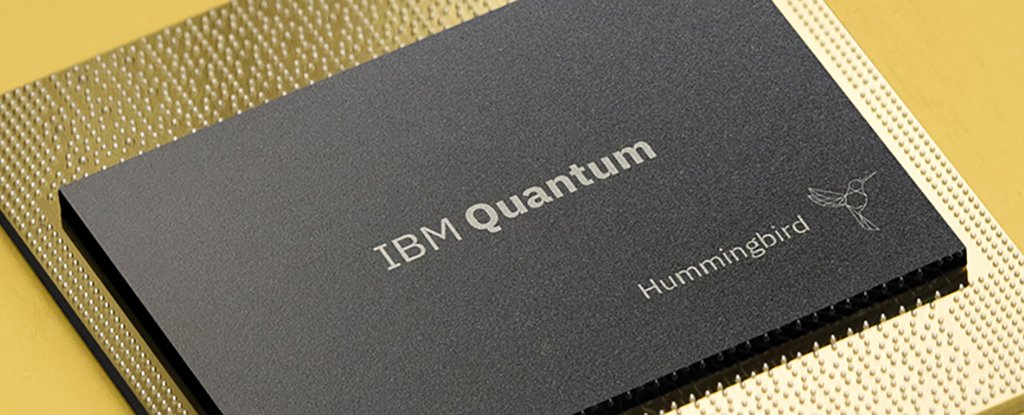
Posted on 09/18/2020 12:34:34 PM PDT by Red Badger
We're still a long way from realising the full potential of quantum computing, but scientists are making progress all the time – and as a sign of what might be coming, IBM now says it expects to have a 1,000 qubit machine up and running by 2023.

Qubits are the quantum equivalents of classical computing bits, able to be set not just as a 1 or a 0, but as a superposition state that can represent both 1 and 0 at the same time. This deceptively simple property has the potential to revolutionise the amount of computing power at our disposal.
With the IBM Quantum Condor planned for 2023 – running 1,121 qubits, to be exact – we should start to see quantum computers start to tackle a substantial number of genuine real-world calculations, rather than being restricted to laboratory experiments.
"We think of Condor as an inflection point, a milestone that marks our ability to implement error correction and scale up our devices, while simultaneously complex enough to explore potential Quantum Advantages – problems that we can solve more efficiently on a quantum computer than on the world's best supercomputers," writes physicist Jay Gambetta, IBM Fellow and Vice President of IBM Quantum.
It's a bold target to set, considering IBM's biggest quantum computer to date holds just 65 qubits. The company says it plans to have a 127-qubit machine ready in 2021, a 433-qubit one available in 2022, and a computer holding a million qubits at... some unspecified point in the future.
Today's quantum computers require very delicate, ultra-cold setups and are easily knocked off course by almost any kind of atmospheric interference or noise – not ideal if you're trying to crunch some numbers on the quantum level.
What having more qubits does is provide better error correction, a crucial process in any computer that makes sure calculations are accurate and reliable, and reduces the impact of interference.
The complex nature of quantum computing means error correction is more of a challenge than normal. Unfortunately, getting qubits to play nice together is incredibly difficult, which is why we're only seeing quantum computers with qubits in the 10's right now.
Around 1,000 qubits in total still wouldn't be enough to take on full-scale quantum computing challenges, but it would be enough to maintain a small number of stable, logical qubit systems that could then interact with each other.
And while it would take more like a million qubits to truly realise the potential of quantum computing, we're seeing steady progress each year – from achieving quantum teleportation between computer chips, to simulating chemical reactions.
IBM hopes that by committing itself to these targets, it can better focus its quantum computing efforts, and that other companies working in the same space will know what to expect over the coming years – adding a little bit of certainty to an unpredictable field.
"We've gotten to the point where there is enough aggregate investment going on, that it is really important to start having coordination mechanisms and signaling mechanisms so that we're not grossly misallocating resources and we allow everybody to do their piece," technologist Dario Gil, senior executive at IBM, told TechCrunch.
https://techcrunch.com/2020/09/15/ibm-publishes-its-quantum-roadmap-says-it-will-have-a-1000-qubit-machine-in-2023/
You read my mind.
Just in time for Diablo IV!
Daniel 12 KJV
4 But thou, O Daniel, shut up the words, and seal the book, even to the time of the end: many shall run to and fro, and knowledge shall be increased.
Decoding military stuff? That does not sound good. Sounds like technology that should be kept out of the hands of certain people or countries.
What’s a Qubit?
It means computers will be practically as smart as people....................some people, anyways..............
“How long can you tread water?”
About 18 inches..................
Dang, I’m slow today.

It’s fun.
I occasionally bust out King’s Quest for PC.
bfd...fu ibm
but as a superposition state that can represent both 1 and 0 at the same time.
= = =
I am going to need more ‘splanin’ on that one (no pun intended).
and are easily knocked off course by almost any kind of atmospheric interference or noise
goodbye encryption. goodbye blockchain.
Yes, but Q encryption would replace the old encryption.
And I just “typed” this in with a pencil! How cool is that!?
Able to deliver pornagraphy and Cardi B interviews in record time.
As someone pointed out, the encryption would have to radically change and quickly to a Quantum level encryption whatever that is....
but one nation having the ability to break the military grade encryption in minutes would give that country a huge strategic advantage for a period of time...
Think back to WW II, the US and it’s allies broke the Japanese Naval Code and using a captured German Enigma machine could listen all the German military communications in real time.....
Bet it will still choke trying to open one large PDF manual.
Meanwhile, D-Wave announced a 5000 qubit computer a year ago.
https://www.techrepublic.com/article/d-wave-announces-5000-qubit-fifth-generation-quantum-annealer/
I bought a VIC 20....
Is that the same?
Disclaimer: Opinions posted on Free Republic are those of the individual posters and do not necessarily represent the opinion of Free Republic or its management. All materials posted herein are protected by copyright law and the exemption for fair use of copyrighted works.